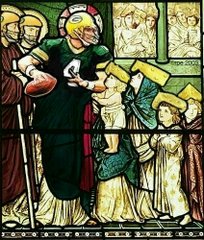Matthew
2: 16-23
Herod, when he saw that he had been tricked by
the wise men, became furious, and he sent and killed all the male children in
Bethlehem and in all that region who were two years old or under, according to
the time that he had ascertained from the wise men.17 Then
was fulfilled what was spoken by the prophet Jeremiah:
18 “A voice was heard in Ramah,
weeping and loud lamentation,
Rachel weeping for her children
she
refused to be comforted, because they are no more.”
19 But
when Herod died, behold, an angel of the Lord appeared in a dream to Joseph in
Egypt, 20 saying, “Rise, take the child and his
mother and go to the land of Israel, for those who sought the child's life
are dead.” 21 And he rose and took the child and
his mother and went to the land of Israel. 22 But
when he heard that Archelaus was reigning over Judea in place of his father
Herod, he was afraid to go there, and being warned in a dream he withdrew
to the district of Galilee. 23 And he went and
lived in a city called Nazareth, so that what was spoken by the
prophets might be fulfilled, that he would be called a Nazarene.
Martin Luther writes:
We resist evil with the ministry of the Word [in Christ’s kingdom
of the Church] and sword [in Christ’s kingdom of the world], and yet, the evils
which cannot be averted we bear to our great advantage but to their detriment
and destruction.
In regard to this line
of thought there is also a celebrated dictum of Gregory: “The ungodly do good
to us by doing evil.” And Augustine says of the infants slain by Herod that an
enemy with his whole strength and all the resources of his kingdom could not
have benefited the children more than by killing them.
Accordingly, God humbles those who are His to exalt them: He kills
them to make them alive; He confounds them to glorify them; He makes them
subject to raise them up.
Still the question
persists, “How can a loving God
allow such horrible things to happen?” For some, the question is an excuse for
atheism. For others, a cry of pain in the midst of trying times, or even a
prayer for faltering faith.
For the Baptized, the
answer as touched upon by Luther, Gregory, and Augustine above, is to be found
in the Word of God and Him made flesh to dwell among us even now in our
suffering. As always, God has the bigger, global, intergenerational, eternal
picture in mind.
·
Joseph said to them, “Do not fear, for am I
in the place of God? As for you, you meant evil against me,
but God meant it for good, to bring it about that many people should
be kept alive, as they are today. Genesis
50:19-20
·
As he passed by, he saw a man blind from birth. And his
disciples asked him, “Rabbi, who sinned, this man or his
parents, that he was born blind?” Jesus
answered, “It was not that this man sinned, or his
parents, but that the works of God might be displayed in him. John 9:1-3
·
Who shall separate us from the love of Christ? Shall tribulation,
or distress, or persecution, or famine, or nakedness, or danger, or sword? As it is written,
“For your sake we are being
killed all the day long;
we are regarded as
sheep to be slaughtered.”
No, in all these things we are more than conquerors through him who
loved us. Romans 8:35-37
·
So to keep me from becoming conceited
because of the surpassing greatness of the revelations, a thorn was given
me in the flesh, a messenger of Satan to harass me, to keep me from
becoming conceited. . . . For the sake of Christ, then, I am content with
weaknesses, insults, hardships, persecutions, and calamities. For when I
am weak, then I am strong. 2 Corinthians
12:7, 10
·
Consider him who endured from sinners such hostility against
himself, so that you may not grow weary or fainthearted. . . . God is treating
you as sons. For what son is there whom his father does not discipline? . . .
He disciplines us for our good, that we may share his holiness. Hebrews 10:3, 7, 10
lm






